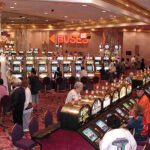By Kathleen Haughney
The News Service of Florida
Las Vegas gaming executives pitched themselves last week as an answer to Florida’s economic woes, saying the industry could invest millions of dollars in Florida building resort-style casinos in South Florida.
 “We are very interested in the South Florida market,” said Andy Abboud, vice president of Las Vegas Sands Government Relations and Community Development.
“We are very interested in the South Florida market,” said Andy Abboud, vice president of Las Vegas Sands Government Relations and Community Development.
Several members of the influential House Seminole Gaming committee have shown interest in hearing about Vegas-style gaming in Florida as lawmakers continue negotiations with the Seminole Tribe over a compact where the state would give the tribe exclusive rights to offer specific card games in exchange for a cut of the profits.
But the presentation by Sands executives was met with skepticism by the House gaming chairman, who said Florida can’t instantly go from a “family friendly, Mickey Mouse state” to a place like Las Vegas and that the proposal would never win passage in the conservative House of Representatives.
Rep. Bill Galvano, chairman of the committee, said that it was time for the state to decide its future in terms of gaming. Indian gaming facilities operate outside the purview of state regulation because the tribes are sovereign nations. And, there are also several pari-mutuel facilities, which say they cannot compete with the tribes because of a high tax rate the Indian facilities don’t pay.
Lawmakers have been clear that they want to protect the pari-mutuels’ interests and have proposed a variety of sweeteners for them as part of the gaming negotiations with the tribe.
“I think the time has come for Florida to step back, catch its breath and figure out where it’s going to go,” Galvano said.
The Seminoles have promised the state $150 million per year from banked card games such as blackjack that they already operate at casinos around the state. The tribe, however, wants exclusivity on operating certain games in exchange for that money.
Several legislators have been squeamish about a massive gambling expansion.
Legislative economists have given estimates on what a variety of gaming scenarios could do for the state including one where the state auctions off gaming licenses and gaming executives would try to outbid each other to run a Florida casino. According to Amy Baker, chief legislative economist, the state could receive anywhere from $435 million to $750 million per license based on what has occurred in states that operate casinos that way.
In the past, the Office of Economic and Demographic Research estimated that a deal the Legislature originally envisioned with the Seminole Tribe would bring in about $802 million by fiscal year 2013. A compact between the state and the tribe proposed by Gov. Charlie Crist over the summer would bring in $811.7 million by fiscal year 2013, economists estimated.
Galvano and his Senate counterpart, Sen. Dennis Jones, R-Seminole have both said they feel optimistic that a gaming agreement with the Seminole Tribe could be reached by the end of the session.
State Rep. Ellyn Bogdanoff, R-Fort Lauderdale, who is a member of the House committee and favors a more free market approach, said she did not see the committee’s meeting with Sands executives as a way of creating a bargaining chip in the Legislature’s negotiations with the tribe.
“Obviously, we have to consider how much gaming we want and make sure we don’t have a saturation, an over-saturation of the market,” she said.


